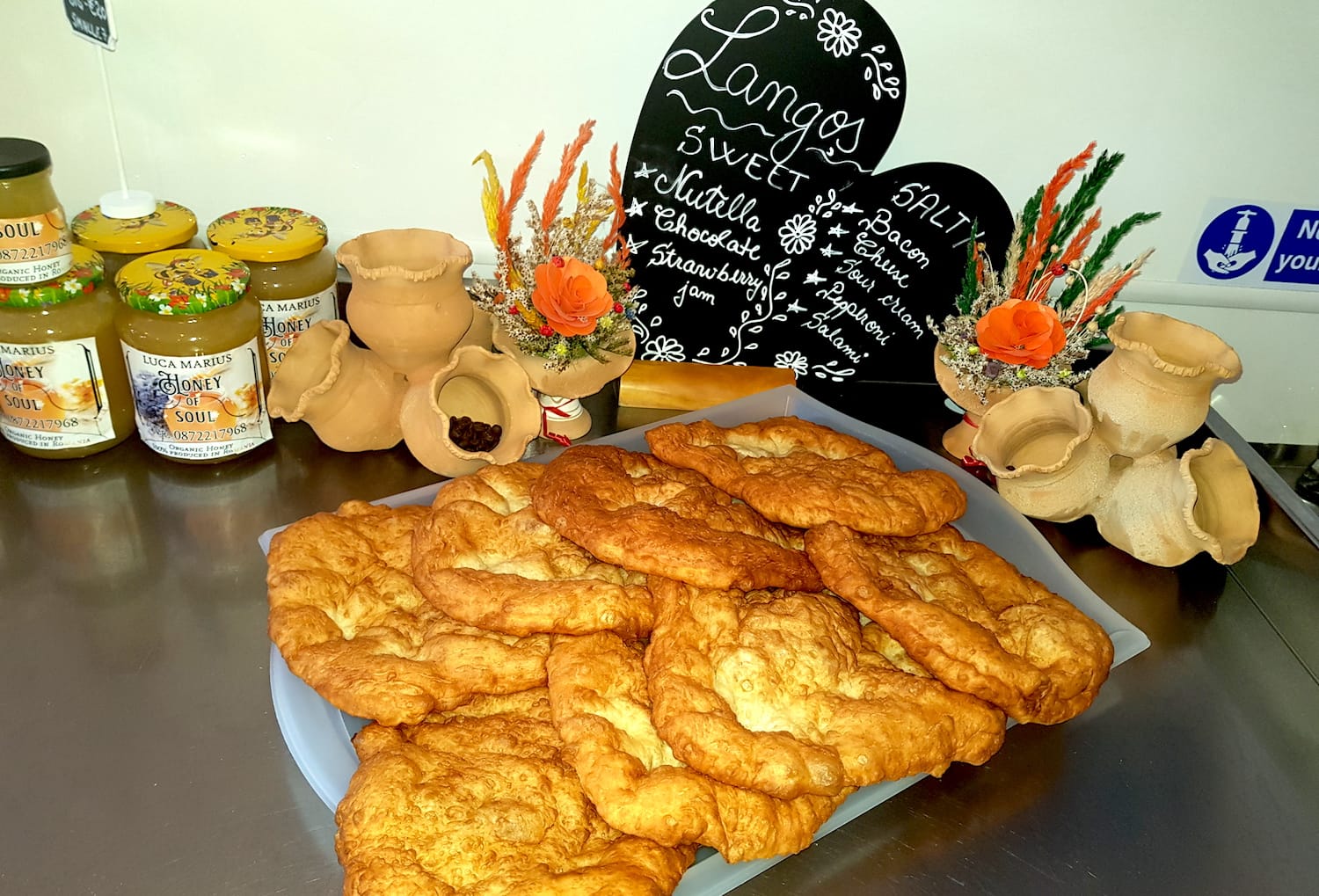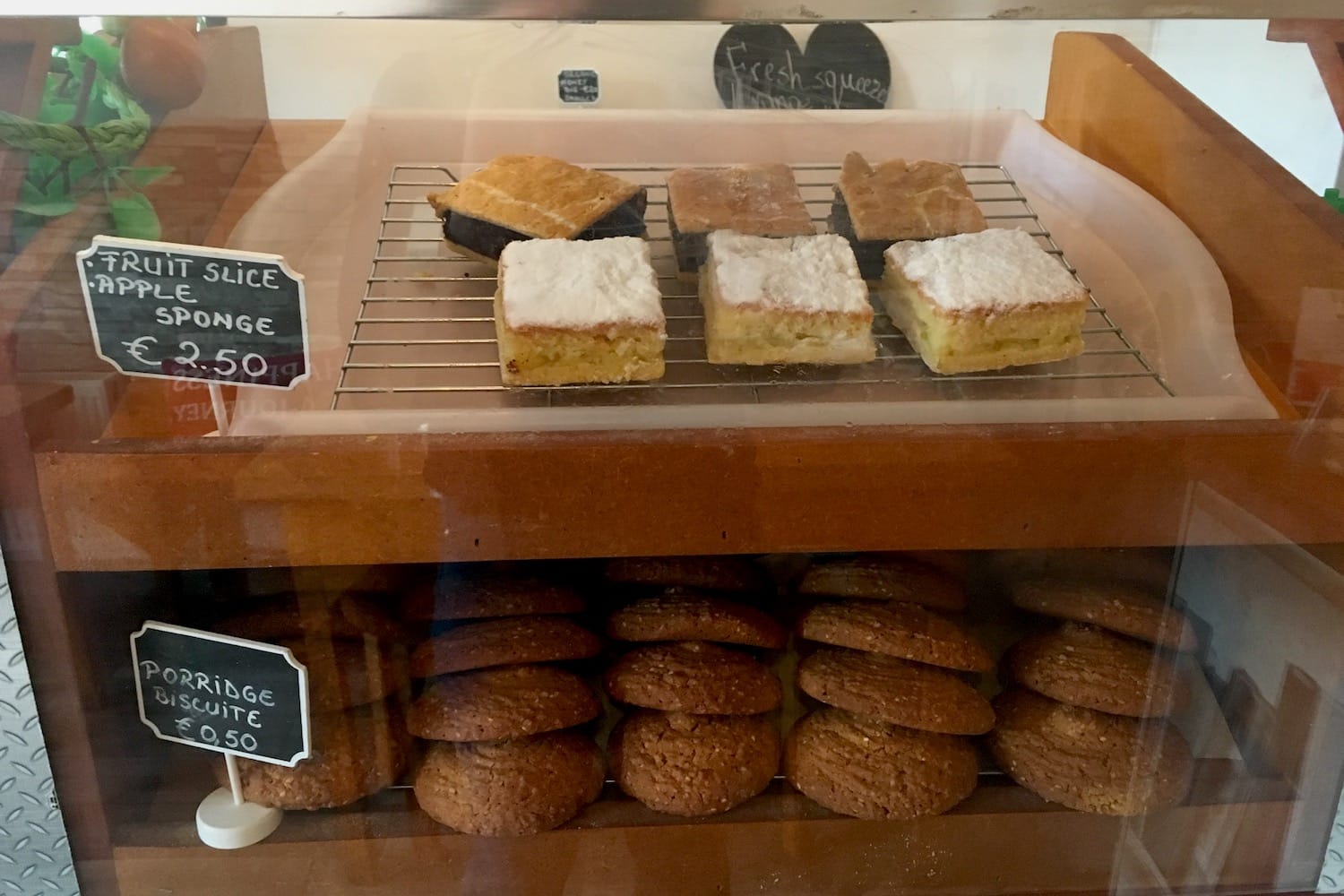What’s the best way to tell area residents about plans for a new asylum shelter nearby?
The government should tell communities directly about plans for new asylum shelters, some activists and politicians say.
“We were thinking of a name for them in English,” says Laura Amariei, of their lángosok. “So we call them ‘crazy doughnuts’.”

Laura Amariei can’t sit down to chat for long. She’s the only person behind the counter this Monday morning at Laica Catering, a cafe and bakery on Dorset Street.
It’s just after 8am and the first customers, an older man and a young woman, have come in.
“The full Irish breakfast. No mushrooms,” the man tells his companion, who then orders for them both. She’s taking the mini breakfast with beans on the side.
The smell of fresh lángosok is wafting through the air, as Laura’s husband Catalin bakes in the kitchen. Later, he’ll put it in the display window next to the kürt?skalács, or chimney cake, another traditional Romanian treat.
There’s usually another chef, but his car broke down. That means Catalin is in sole charge today of making the Romanian pastries, porridge biscuits, Danishes and sponge cakes, as well as breakfasts and lunches.
As the morning wears on, Catalin cooks, and Laura chats with customers as they come and go.
“Is everything alright?” she asks one woman who looks downcast as she pays for her tea at the counter. “Ah, you know, it’s a Monday,” the woman replies.
Laura and Catalin Amariei, who are from the city of Roman in Romania, moved to Dublin in 2007.
Laura, who has reddish pink hair, worked as a waitress here before becoming a hairdresser. Catalin worked as a kitchen porter for two years and later as a chef.
One day, Catalin suggested they open their own place. Laura took barista courses and returned to working in a restaurant for six months.
Catalin shows off the kitchen when he gets a break after the morning rush. There’s a special oven for the chimney cake. You wrap the dough around a metal cylinder and turn a wooden handle on the outside slowly.
When he started, Catalin says, he had no one to guide him. Working in kitchens, his mind would drift off to the cafe and he would take down notes, studying everything he could for when Laica would open.
“All the time in work I did what I had to physically in work and my mind was [in the cafe] all the time,” he says.
This process took two years, Laura says, in between serving customers.
“We were taking notes and making plans all the time. We were searching for equipment, I searched for the best coffee. Everyone loves the coffee.”
Laura spotted builders inside the empty premise on Dorset Street one day on her way home and kept inquiring until the agents put her in touch with the landlord.
They renovated the place themselves, and a friend made the wooden stools, tables and countertops. They finally opened on St Patrick’s Day last year.
It’s bright and homely inside. The handmade wooden chairs are topped with red, embroidered pillows and the wallpaper resembles grey bricks.
There’s large lettering on the wall saying “Laica Catering”, with a flower motif.
Laica is a name she made up using the first letters of her, Catalin’s and their son Iannis’ names.
“We wanted a rustic look. Somewhere that’s like home where you can read a book and have a coffee,” Laura says.
Learning how to be a manager was hard, she says. But she loves working with people.
She’s nervous about her English, she says. But it doesn’t hold her back from being chatty, and you can hear the slightest twang of a Dublin accent.
“Was it busy over the weekend?” asks a regular customer. He’s sitting with his coffee and taking some porridge biscuits to go.
“It’s always busy if there’s a match on at Croke Park,” she says. “But if Dublin plays, not so much. I think it’s people eat at home instead.”
It’s because people are too busy drinking, he says. He asks if she’s ever considered doing a breakfast roll.
She laughs and says: “Nah, you can get them anywhere. We want to have some standards.”
Cafe culture isn’t big in Romania, says Laura. “When we left, coffee wasn’t a big deal there.”
They considered starting with a smaller place for street food but settled on opening the cafe and slowly adding food.
“The people around here asked for breakfast and soup so we added them on the menu, step by step. The customers are your own boss,” Laura says.
When they started, they had an equal split between Irish and Romanian customers. They had more traditional Romanian desserts like nuci umplute, which are small walnut-shaped cookies or pasca cu branza, a Romanian Easter cake.

According to the last census, there were more than 29,000 Romanians living in Ireland. Over half of them live in Dublin or in commuter towns.
But Laica’s Irish customer base grew faster, and they realised many people weren’t really open to trying the Romanian food, says Catalin. They liked scones and more traditional Irish foods, so now some of the Romanian pastries are only by request.
They had to adapt to what people wanted, Laura says. “I think Irish people, they are more around [the area].”
You’ll find club sandwiches, gourmet burgers, spinach ravioli and homemade juices for lunch. But the lángos is still readily available, a deep-fried dough that can be topped with everything from cheese to chocolate.
“We were thinking of a name for them in English,” says Laura. “So we call them ‘crazy doughnuts’.”
There’s also the kürt?skalács, and they sell jars of organic honey from a beekeeper in Romania, too. The porridge biscuits are hugely popular and people buy them in bulk, Laura says.

They also make brown and white bread. “We have our own recipe,” says Laura.
On the weekends, they make occasion cakes. “Everything is homemade, including the creams,” Laura says. “We have a girl from Moldova who is really good. She’s amazing. She studied [cake-making] for six years.”
The Amarieis have a shop at Dorset College, where they sell soups, sandwiches and pastries along with beverages and bars. It’s run by Laura’s sister Oana.
They do catering for events too, but only once every two months as they continue to find their feet.
When they started, it was just Laura and Catalin. Their days would begin at four or five in the morning and finish at five in the afternoon.
“We were young and excited, we wanted to do things right,” says Catalin.“We were thinking when [people] come in the door, we want everything to be ready, fresh.”
There are now eight staff members in total so Catalin and Laura can start a little later now, at half six, but there are still no days off.
They couldn’t take Sundays off because the business they get from the matches in nearby Croke Park is too good, she says.
They initially wanted to take bank-holiday Mondays off. But when they tried, customers would call her or come in on the Tuesday, asking why they hadn’t been open the day before.
Next month, though, they’ll travel home to Romania for a wedding and stay for three weeks.
“We’ve had no holiday in two years,” Laura says. “I want to recharge my batteries and come back with more energy because we want to do more things. There’s another college asking us to do catering.”
They also hope to start a dinner menu, and keep Laica open a bit later.